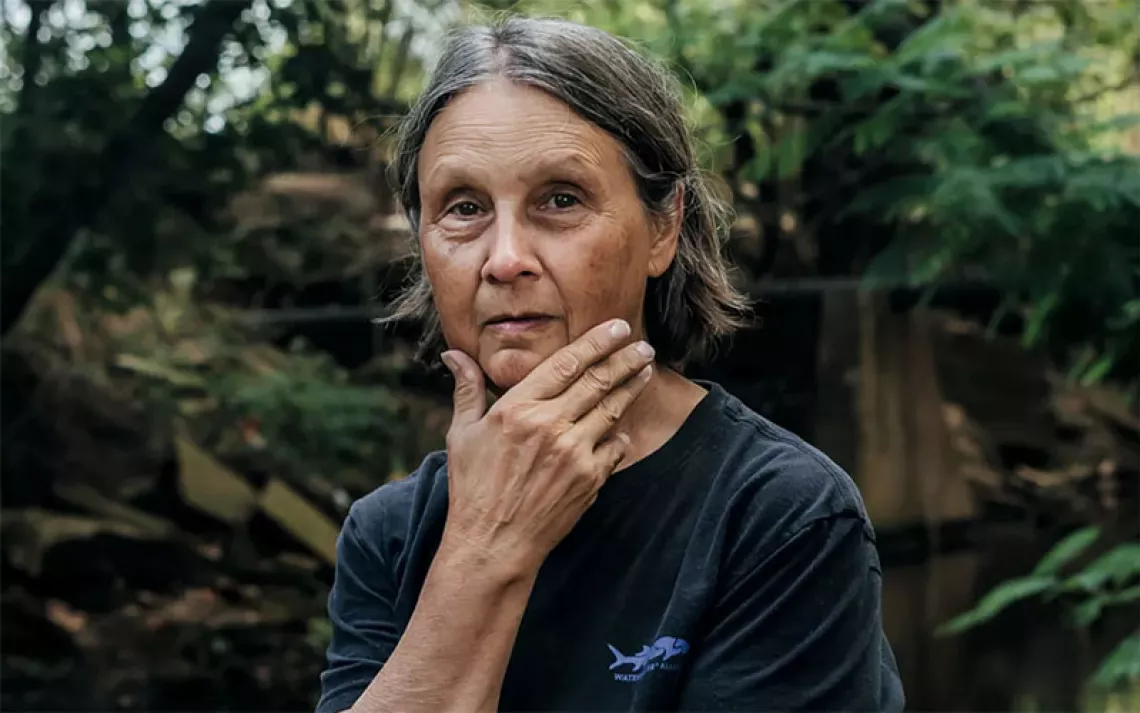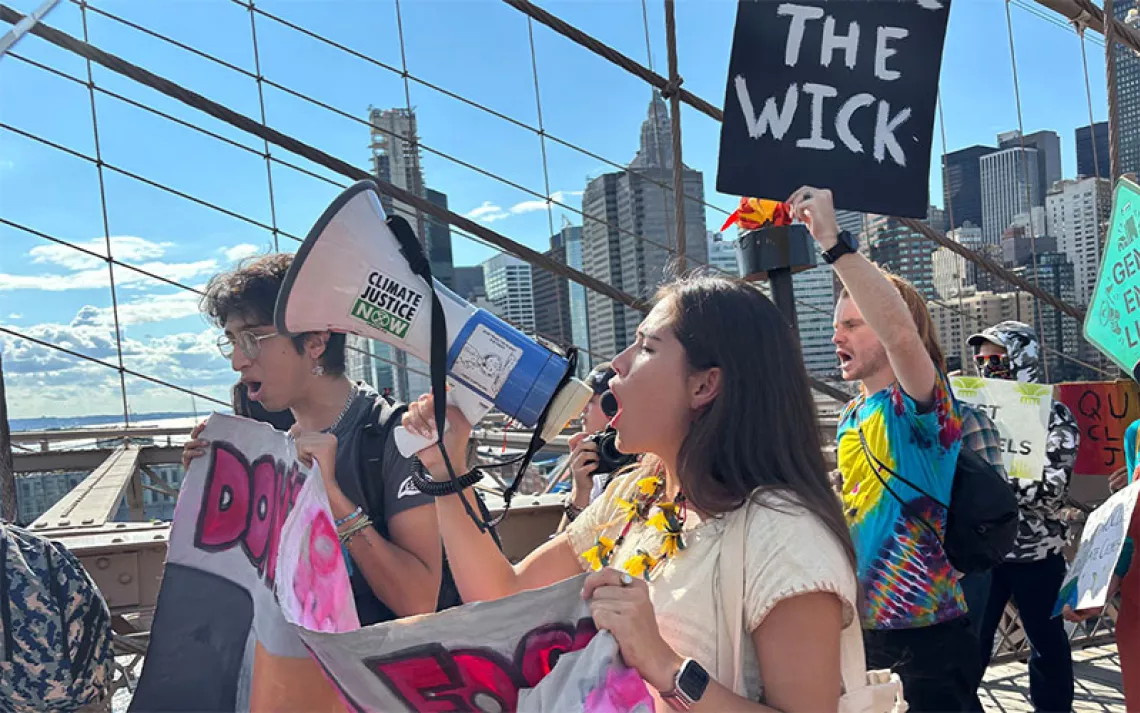What Our Readers Have to Say
Feedback on our May/June issue
SAFETY FIRST
After reading your May/June issue, I came away wondering: Why does communing with nature always have to be so life-threatening? Dangerous mountain treks, harrowing whitewater trips, suicidal rock climbing—what’s wrong with just taking a walk in the woods that you know? Sitting and enjoying a sunset? Why all the adventure and death-begging activities? Isn’t there enough danger in everyday life?
Fran LangePittsburgh, Pennsylvania
SHADY SHENANIGANS
As a rooftop solar owner, I found “Throwing Shade” (May/June) to be a fascinating read. It can hardly be surprising that utility companies are creating roadblocks to further expansion of home solar projects. Indeed, squashing competition in the name of profits is part of the game of capitalism. However, it should act as a wake-up call to the masses and to our leaders to rally against this. Allowing these shenanigans is both bad environmental and bad public policy.
Tom PortueseQueensbury, New York
The problem is that most people with rooftop solar panels have installed what I call a “half system.” A full system has a battery bank, so that during the day, rooftop panels power the house and charge the batteries. At night, the batteries power the house. The homeowner is off the grid, completely independent, and no money is exchanged with the utility. On cloudy days, a backup generator can keep essential items like refrigerators running until the sun shines again.
Carl NyeJerome, Arizona
UNFRIENDING FACEBOOK
Michael Brune’s article “Money Talks, Carbon Walks” (“Create,” May/June) urged readers to divest from polluting corporations and to invest in responsible institutions. Start by divesting from Facebook. About a year ago, Facebook founder Mark Zuckerberg led a lot of tech industry leaders in launching a group called FWD.us. Their seven-figure ad campaign applauded legislators for supporting the Keystone XL pipeline, and Zuckerberg donates to groups promoting the pipeline. Facebook also joined the American Legislative Exchange Council (ALEC), a far-right organization that promotes corporate interests above all else and has an extreme anti--environmentalist agenda.
Philip RatcliffSalem, Oregon
WEB-ONLY LETTERS
COVER
I found the title of the May/June 2014 Sierra magazine, "Put In, Ship Out," interesting for its subliminal (or not so subliminal) reference to Putin, Ship Out (of Ukraine, that is).
Tom ZukWilliamsburg, VA
The cover of your May/June 2014 struck me as timely and right on the mark in relation to current international politics. I read "Putin, Ship Out", when in fact it said "Put In, Ship Out".
Barbara HunterMenlo Park, CA
Your very interesting article on the Muskego would have been even better had you included a map of the journey, no matter how crude. Actually, the same criticism applies to your article on Southeast Alaska as well as many other articles on the outdoors: you need more maps. Yes, I can Google-map it, but your articles don't always give enough detail to identify an exact route or locale. Also local place names can be a bitch and not every reader is next to a computer attached to the Internet. Outdoors people can't prosper without maps. What makes you think your readers can?
David BurressLawrence, Kansas
THROWING SHADE
I have rarely written to publications about their articles, but I've read, and re-read, "Throwing Shade", and am amazed, upset, angry, and in disbelief. The President, and others, has been pushing "renewable energy" for years. Now that the upfront cost is decreasing and making it a possibility for some, the utilities are throwing up humongous roadblocks -- as is the case in Hawaii!!
I can understand the utility's not wanting net metering, and I don't have a big problem with that, except that the homeowner or businessman that puts it on his property is supplying electricity at the exact time of day that the big utility companies are going into a panic stage because of high demand during hot days. And, even if the utility companies can work out a lower return to the homeowner and businessman, they shouldn't be fighting to keep solar from it's normal and fruitful advancement.
Where and how can I get more copies of this article? I want to use it when talking to my State Assemblyman, and also pass it out to others that, similar to us, are considering adding solar to our homes. We think by spending thousands of dollars we are doing good for the benefit of others, and now may be punished, or worse, denied access to the system.
Dorothy MildiceSan Diego, California
How amusing to read Ed Hume's well-written blast against utility companies that resist rooftop solar--but then I found this MarketWatch article recommending Hawaiian Electric Company stock (HE) because of the reliable 5% dividend. MarketWatch did not mention the Sierra Club article.
As long as investors make decisions based on profits and ignore the ecological consequences, we are . . . just heading down the business-as-usual road--as usual. Will Hawaiian Electric have any problems with rising sea level?
Mike WilsonEvergreen, Colorado
I am ordinarily a calm individual, but felt my blood pressure rising as I read the article regarding electric utility companies' efforts to block consumer use of solar panels to generate electricity that may create more energy returned to utilities' stores. And the Koch brothers turn up again, financing anti-solar advertisements! Arghh! I am not directly affected but wondered if you could comment on ways that individuals like me might help bolster efforts to promote use of solar energy.
Marcia Kaplan, M.D.
As a net-metering, rooftop-solar owner, I found "Throwing Shade" to be a fascinating read. It can hardly be surprising that utility companies have begun to create roadblocks to further expansion of home solar projects. Indeed, squashing competition in the name of profits is part of the game of capitalism. However, it should act as wakeup call to the masses and to our leaders to rally against this. Allowing these shenanigans is both bad environmental and public policy.
Tom PortueseQueensbury, New York
I just read in your latest issue that the net metering program in California will expire in a few years. When that happens, utility companies will purchase energy from customers at wholesale, instead of retail, rates. I am a solar owner, and my utility company, SMUD (Sacramento Municipal Utility District), has already been doing that for quite some time. Are they not supposed to be? Actually, I don't mind--I'm happy to be supplying clean energy to my utility company. What I am hoping, though, is to be able to have battery storage at some point.
Lindy Rice Tillement
Like most (or all) of your readers, I am a strong proponent of alternative energy. However, the cause is not furthered by inconsistent arguments about the alleged "benefits" provided to power companies by homeowners' adoption of solar power.
The article states that "it reduces the need for expensive new power plants ... requires no fuel," etc. However, these are elements of the companies' profit-making enterprise. By that logic, the companies would benefit even more by going out of business entirely, or your local auto service station would profit by having half its customers learn to repair their own vehicles, enabling it to divest itself of half its machinery and payroll. The societal benefits are persuasive on their own without lawyerly additions.
Henry SchneiderRye, New York
Your May/June issue's feature focus is on net metering of solar energy. By far the longest article in your magazine, yet it fails to address the most salient fact about net metering. Net metering was designed to be a temporary program to stimulate the solar market. The caps on participation were put in place for a reason. Under net metering, homeowners are encouraged to size their systems in such a way as to "zero out" their electric bills. During peak solar production hours, they export power to the grid, receiving full retail credit, and during non-solar production hours they draw power from the grid. In principal, and in practice, the export credits and nighttime usage offset each other and the customer can end the year with no net payments to the utility.
Consider this: the customer pays no money to the utility, yet the utility is obligated to provide service to the customer. How can the utility pay for the power lines and infrastructure to serve the customer during non-solar production hours if the utility collects no money from the customer? The only possibility is to charge more from customers who don't have solar, hence the utilities' assertion that it is a subsidy. As more customers go solar, rates to remaining customers will have to go up at ever increasing rates, a situation the utilities rightfully refer to as the "death spiral."
No serious consideration of net metering can be entertained if it does not address this central fact.
Mike King
Regarding your "Throwing Shade" (May/June) article: the problem is that most people who have installed rooftop solar panels have only installed what I call a "half-system". Their system makes electricity when the sun shines and powers their home, plus the extra that is sold back to their electric utility. At night, they buy power for their home from the utility (usually at a higher rate than they were paid for the electricity they sold to the utility). That's how a half-system works. On the other hand, a full system includes a battery bank, so that during the day rooftop panels power the house and charge the batteries. At night, the batteries power the house. NO connection to the utility is required. No connection to the grid. NO money is exchanged with the utility. The homeowner is "off the grid", and completely independent. Due the obviously higher initial cost to install a full system, most homeowners have elected the half-system with all its net-metering downfalls. But what about cloudy days, one might ask. In a worst-case scenario, a backup generator could provide sufficient power to keep essential items going, like the refrigerator, until the sun shines again.
You need to correct the serious lack of information in the article on solar power in "Throwing Shade" by Thomas Humes in the May/June issue of "Sierra."
I have solar electric panels for my home, and haven't paid an electric bill in a year. I also have solar hot water panels that don't work well in December due to cloud cover.
Solar panels do not work at night. My lights and refrigerator and TV and other loads use atomic and water power generated for my local utility for night use. Your article does not mention this obvious problem. Something has to keep the lights on at night. Consumers can use expensive battery packs to store day energy to use at night. Utilities can make big water storage lakes and pump water uphill in the sunny day and make night electricity by running that water back downhill through their big generators.
This is a big problem for utilities. Those big generators don't like to have their load go up and down too much. They must be kept turning day and night, at exactly the right speed, if there is a load or not.
If everyone in Hawaii got solar and the power utilities went out of business, Hawaii would be a very dark place at night.
Wind energy might be good in Kansas where the wind blows even at night. In Vermont, that wouldn't work well, even on mountain ridges.
Deep earth heat exchangers that pump heat from over 200 feet deep in the ground can extract heat 24 hours a day, but need a source of electric to run the pumps, but that should be easy to engineer. Air to air heat pumps would need an electric utility since it needs as much power to pump energy out of below zero air as what you get from trying that, so at those temperatures you might as well turn off the heat pump and run the wood stove.
So, if those who buy solar electric panels want power at night for lights and refrigerator and charging cell phones, they had better think of their local electric utilities and the money they need to keep the generators going and the transmission lines working.
Local energy is a great idea but solar panels don't do it. They turn off at night and cloudy days.
P. Grant
You asked for it - your little article on advertising was sexist and dumb - "I take at least as much pride in all you sexy Sierra readers as Hef does in his" - REALLY? It's about you? And about being sexy? Remember that (I hope to heaven) Sierra appeals to more then you imply in your note.
AnonymousSanta Cruz, California
I was dismayed at Editor in Chief Bob Sipchen's note to readers in the May/June 2014 issue of Sierra. The reader you described was an adventurer -- probably male and quite young -- seemingly more fit for Outside magazine than Sierra. Unless I'm misunderstanding what Sierra is all about. I was thinking environmentalists of all sorts: young, fit people like you described out enjoying grand adventures, but also middle-aged people who have to work most weeks of the year and yet care every day about the environment, and seniors who might spend some of their retirement funds on solar panels. I think you were way off base: most of us are NOT "giggling on the back of your girlfriend's tandem," or "hoisting your sweaty self" up anywhere, or "battering your way through Class V rapids at sunset."
I'll keep reading, but now with a grain of salt.
Pam De Pena
First, great job characterizing the Sierra reader.
Second, I'd like to suggest an additional question that is revealing
-- What Other Magazines Are On Your Coffee Table? On mine are Wired, Popular Science, and the new ACLU magazine called Stand" I think we'd all be interested to know the answer here
Michael Brune's article "Money Talks, Carbon Walks," urged readers to divest from polluting corporations, and to invest in responsible institutions. Start by divesting from Facebook. About a year ago, Facebook founder Mark Zuckerberg led a lot of tech industry leaders in launching a group called FWD.us. Their seven-figure ad campaign applauded legislators for supporting the Keystone XL pipeline. Zuckerberg donates to groups promoting the pipeline. Facebook also joined the American Legislative Exchange Council (ALEC). ALEC is a far-right organization that promotes corporate interests above all else, and has an extremist social agenda.
Philip RatcliffSalem, Oregon
In your latest issue, M. Mount states that the trip to Midway Is. requires "multiple stops". NONSENSE! The flight is nonstop from Honolulu. Where would one stop? In midocean? The little lady has never been there, or she was flying a China Clipper with pontoons. Please hire reporters who don't lie. (Yes, I've been there.)
Jeffrey Dickemann
GRAPPLE
I thought that fellow lovers of wildlife would like to know that the article about the snowy owl that was hit by a bus in Washington, D.C. has a happy ending ["Up to Speed"].
The owl was rescued by two Washington police officers, it was turned over to a shelter to be rehabilitated. The owl was transported to Mi. and released back into the wild.
Robert Dinse
Annandale, Virginia
I just received Sierra May/June 2014 with its "Up to Speed" lead, illustrated story on the snowy owl hit by a Metrobus. Actually, an SUV also hit the owl.
The "Up to Speed" item would have been better if it had mentioned that the owl was not killed but was turned over to bird rehabilitators. After a final rehabilitation stint in Minnesota, the owl was released into the wild near Superior, WI, on April 19, 2014, well before the cover date of the May/June Sierra.
The Sierra report on the owl substandard. Unless one lives in the Washington, DC, area and knows the story, the only conclusion a reader could reach is that the owl was road kill. Your selective use of the facts of the case is not one of the brightest moments for Sierra. You owe your readers an update in the next "Up to Speed."
James Nach
Falls Church, Virginia
I very much enjoyed reading the interview with "Years of Living Dangerously" creators Joel Bach and David Gelber. Equally I am enjoying viewing the series, but was much dismayed to find Arnold Schwarzenegger as one of the celebrity "journalists." While viewing the report on climate change's effect on forest fires, I wondered how many of Schwarzenegger's five Hummers he is still driving. I also had to cringe when he expressed concern for the toll taken on the families of the firefighters. Really? Was this the best they could do in picking a celebrity to represent the cause?
James W ScheerSoquel, California
Readers are encouraged to post comments online at sierramagazine.org. Email sierra.mail@sierraclub.org or write to us at 85 Second St., 2nd Floor, San Francisco, CA 94105. Include your name, city, and email address or phone number.
 The Magazine of The Sierra Club
The Magazine of The Sierra Club



